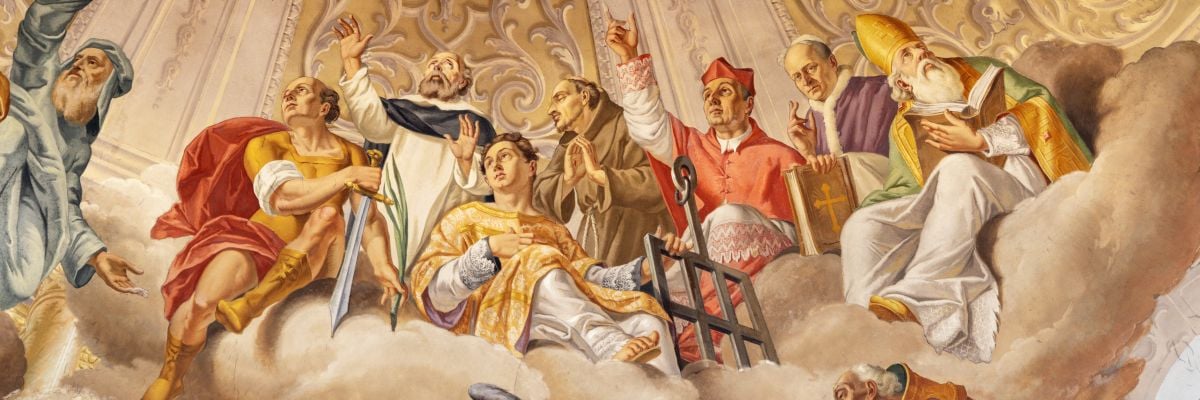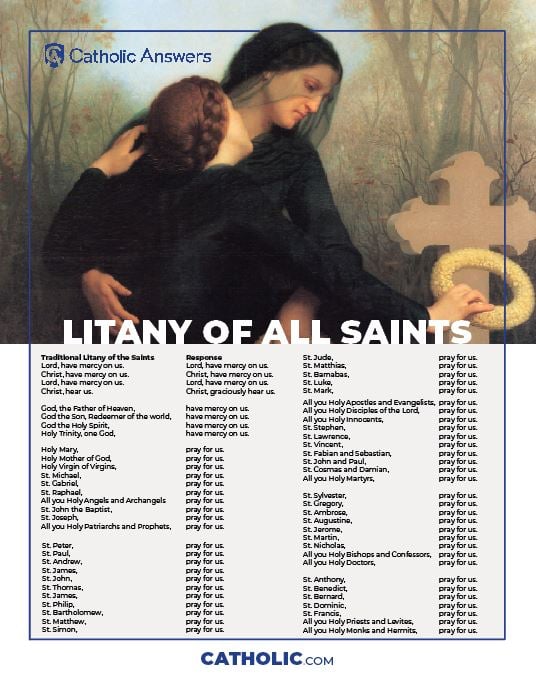
What Is All Saints Day?
All Saints Day, celebrated on November 1 in the Roman Catholic Church, is a holy day of obligation, and many other Christians celebrate it too, including Eastern Catholics on the Sunday after Pentecost. On this day, the Church honors all saints, both those formally canonized and others who have attained heaven (see Heb. 12:22-24). These saints are individuals who have lived lives of extraordinary faith and dedication to God, serving as role models for Christians. Whether officially recognized by the Church or not, these saints have played a significant role in spreading Christianity and leading others toward holiness (Matt. 28:18-20).
How All Saints Day Is Observed
We observe All Saints Day by participating in Mass, as it is a holy day of obligation, and in honoring all the saints in a special way at that liturgy. Many Catholics also take part in prayers, reflections, and celebratory meals, as well as visit the graves of loved ones to remember and pray for those who have passed away. Explore Mass times, cultural traditions, and other devotions with Catholic Answers:
- Mass Times and Religious Observances
- Costumes and Cultural Expressions
- Prayers and devotions
All Saints Day Prayers
Download our printable PDF Traditional Litany of the Saints.
Hallows Day and Halloween
The word “Halloween” comes from “All Hallows’ Eve,” which is the evening before All Saints Day, also known as Hallows Day. The tradition of Halloween, now celebrated in many countries, has roots in ancient Christian customs. Early Christians would prepare for All Saints Day by holding a vigil on the night before. Over time, Halloween became a secular celebration, but its Christian origins are still remembered. What other historical event is October 31st known for? Reformation day.
Holiness consists simply
in doing God’s will,
and being just what
God wants us to be.
-Saint Thérèse of Lisieux.
Halloween and All Saints Day
Can Saints Hear our Prayers?
Wondering whether the saints in heaven can hear our prayers? Watch this video with Jimmy Akin, senior apologist at Catholic Answers, as he explains and defends this important Catholic teaching. See also our related tract and article by Fr. Mitch Pacwa, S.J.
The Origin of All Saints Day
The observance of All Saints Day goes back to the early centuries of the Christian Church. Initially, Christians would celebrate martyrs on the anniversaries of their death, because those days marked their birthdays unto eternal life with Jesus in heaven. However, as the number of martyrs grew during persecutions like that of Emperor Diocletian and his successor—which lasted from A.D. 303-311—it became difficult to assign a specific day to each witness who died for the Faith. Therefore, beginning in the fourth century, the Church established a common day to honor all martyrs, including in two cities in modern-day Turkey: Edessa on May 13 and in Antioch on the first Sunday after Pentecost.
In the year 609 or 610, Pope Boniface IV consecrated the Pantheon in Rome to the Blessed Virgin Mary and all martyrs, choosing to commemorate the saints on May 13. Later, Pope Gregory III (731-741) dedicated a chapel in St. Peter’s Basilica to all saints and moved the celebration to November 1. Finally, Pope Gregory IV (827-844) made November 1 the official date for the Feast of All Saints throughout the entire Western Church, thereby also recognizing and respecting the same celebration of Eastern Catholics earlier in the year.
Is All Saints Day a Holy Day of Obligation?
Yes, in the Catholic Church—November 1 in the Roman/West and the Sunday after Pentecost in the East—All Saints Day is a holy day of obligation. This means that Catholics are required to participate in Mass to worship God and also glorify him through honoring all of his saints in heaven. Many Christians also take this opportunity to reflect on how they can live more saintly lives. The day emphasizes the connection between the saints in heaven, the faithful in purgatory, and Christians still living on earth, inspiring and exhorting believers to follow the path of holiness.
The Feast of All Saints
The Solemnity of All Saints—a solemnity is the highest level of liturgical feast in the Catholic Church—is a time to remember every saint. So it’s a day to celebrate not only famous saints like St. Francis of Assisi and St. Teresa of Calcutta, but also ordinary Christians who lived virtuous lives. The day commemorates their dedication and love for God, whether or not the Church has officially recognized their having attained heaven.
In addition to participating in Mass, many Catholics take part in special All Saints Day prayers. These prayers ask for the intercession of the saints and reflect on the Christian calling to follow in their footsteps. You might also hear a special hymn—For All the Saints—which is often sung during the day’s liturgy.
Praying for the Dead and All Souls Day
Following All Saints Day, Catholics observe All Souls Day on November 2. This day is dedicated to praying for the dead, especially those who have passed away within the past year. While All Saints Day honors those in heaven, All Souls Day is focused on praying for the souls in purgatory, helping them reach heaven through prayer. Many people also visit the graves of their loved ones on this day, interceding for their eternal rest.
All Saints and All Souls Day Prayers
On both All Saints Day and All Souls Day, special prayers and novenas, such as the All Saints Novena, are offered. Catholics believe in the power of prayer to assist those who have passed on, because they are all united in the Mystical Body of Christ (see 1 Cor. 12:12-26; Rom. 8:37-39). This includes asking the saints in heaven to intercede for their brothers and sisters in purgatory. So we honor the saints in heaven on All Saints Day and pray for those en route on All Souls Day, reaffirming the spiritual connections between the Church Triumphant in heaven, the Church Suffering in purgatory, and the Church Militant here on earth.
Celebrating All Saints Day in the United States
In the United States, All Saints Day is celebrated in Catholic parishes with special Masses. Some schools, especially Catholic ones, allow students to dress up as their favorite saints, learning about their lives and sharing stories with others. Families attend All Saints Day Mass, and may also participate in other church events, including a communal meal with candy for the kids (and the adults!😊). They may also engage in storytelling about and/or reflections on the lives of the saints. By honoring the saints, Christians are reminded that holiness is possible for all who follow Jesus faithfully (Matt. 6:33).
There are festive traditions elsewhere in the Church. For example, in Mexico, All Saints Day is closely linked with celebrations in which families gather to remember loved ones who have died, combining elements of both All Saints and All Souls Day with their own unique customs.
Mass and Other Celebrations for All Saints Day 2024
Looking forward to All Saints Day 2024, parishes will offer special Mass schedules to accommodate the holy day. Be sure to check your local church’s All Saints Mass schedule or use online tools like the Mass Finder to plan ahead. Participating in Mass is a key part of the day’s celebrations, allowing Catholics to come together to worship God, as well as to honor the saints and seek their intercession.
In conclusion, All Saints Day is a rich and meaningful celebration in the Catholic Church and other Christian communities. It provides an opportunity to honor those who have gone before us, to reflect on our own spiritual journey, and to pray for those who have passed away. Whether through prayer, participating in Mass, and/or reading about or reflecting on the lives of the saints, All Saints Day invites everyone to aspire to live holy lives.
Additional Resources
Primer on Indulgences
Indulgences are part of the Church’s infallible teaching. This means that no Catholic is at liberty to disbelieve in them.
Quick Q & As
- Is it okay to celebrate the Day of the Dead?
- Do we have to go to mass on All Saints Day on a Monday?
- Whom do we honor on All Saints Day?
- How do our good works and prayers benefit the souls in purgatory?
- Is it a mortal sin to miss Mass on a Sunday or other holy day of obligation?
- It’s ok to celebrate Halloween.
Books
- The Saints Pray for You
- 20 Answers: The Communion of Saints
- Purgatory Is for Real
- The Saints Chronicles Collection 1, Collection 2, 3, 4, 5.(Graphic Novels)
Online Video Course



